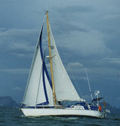Weatherly Sailing Adventures







A few hours past the Hanish Islands, the wind dropped rapidly until were motoring towards Massawa on the opposite coastline. 8 hours before Massawa, in the mid afternoon, we stopped off at a low lying, vegetated, sand and reef island called Port Smyth. I had a brief rest, while Jo explored the island.
I then realised it was Easter in Eritrea, and the immigration offices would be shut for 3 days if we didn't clear in to the country by the next afternoon (Friday). So at 2am, we picked up anchor and, slowly retraced the GPS track I'd stored on the way in, out through the coral lagoon under a full moon.
Tying up alongside the long concrete ship wall in Massawa the next morning, we hopped ashore to find immigration and customs offices. The sun was already beating down fiercely, in one of the hottest cities on earth (according to the encyclopaedia on my computer).
People here looked more African than the Arabic people of Yemen, and were very poor, but cheerful and friendly.
We motored around to the anchorage and met new friends Kit and Sally on "Skerryvore" who both wore pairs of distinctive rubber shoes, which seemed to go with their sense of humour. We decided to travel together up to the capital, Asmara for a few days.

The minibus had around 30 squeezy seats, and we asked the driver if we could pay for 2 each, to make the 4 hour trip more bearable, as there was no safe stowage for our awkward backpacks.
Making light of our relative comfort at the back of the bus, compared to the locals crammed together, Kit humoured us with pompous comments like "Make way, we're British !", but soon the joke was back on us.
Some military staff occupying the seats in front of us tried to get their other military chums to sit in amongst our group, but we pleaded with the driver that we were happy to pay for our spare seats. After some heated exchanges between driver and soldiers, an attempted photo by me of the debacle, and surly looks from the guys in front of us, who told me "Not allowed!" waving a finger at me, we thought it best to give up all our seats and try another bus. Better that than getting into a confrontation with armed and angry soldiers !
A donkey and cart trotted by, and I joked with an Eritrean guy helping to find us transport, that we take it to Asmara. At least there was plenty of room on the cart. Finally, another bus arrived and we paid for 2 seats each without any pandemonium.
The scenery on the way up was rugged and mountainous. At one stage a large and fearful looking group of baboons with pink faces (and backsides) charged alongside the bus, scavenging fruit tossed at them from the windows.
The bus stopped halfway along the route on a dusty paddock, and kids rushed up to the windows
waving small bundles of twigs. One said to me "Very fresh", which I thought was amusing - fresh twigs?? Then
we found out (via a toothless old crone sitting in front of me) that they are used for toothbrushes. I can vouch that they
actually work very well, and only cost 1 nakfa for a bunch !
Then again, perhaps they are just twigs.
We found a cheap hotel looking across at the cathedral (Italians brought Catholicism to the country when they colonised Eritrea) and explored the town. It has a distinctly Italian/European feel too it though practically everyone were African Eritreans. People sat at outside street cafes drinking coffees or in groups at parks, conversing civilly with expansive arm gestures. We had a pizza one night and a bottle of vino, and coffees at a trendy, terraced cafe the next morning.
The temperature dropped down very comfortably at night and I enjoyed some good night's slumber after the stiffling heat on the coast.
Jo needed to get $US, but we were unable to locate any banks which could exchange money back from Eritrean Nakfa into hard currency. It was frustrating, and we visited virtually every bank in Asmara, including the government bank which receives the hard currency from minor banks, all to no avail. I even thought to take pictures of us visiting Asmara banks, because that occupied most of our travel time there.
The poverty in Massawa, was a huge contrast to the capital city. Most buildings still standing showed scars of the long war with Ethiopia, though some of the architecture has a grand Ottoman influence, with pillared arches and oppulent, high ceilings. Back on the streets, kids smiled and tagged along behind us giggling and accepting sweets from Jo. I gave out pens which seemed to be always in demand by the Massawa children. It was a delightful stay.




